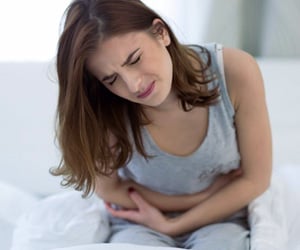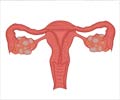Polycystic ovary syndrome (PCOS) increases the risk of contracting COVID-19 among the affected womenwith a 51% increased risk in women with PCOS when compared to those without PCOS.
- Polycystic ovary syndrome (PCOS) increases the risk of contracting COVID-19 among the affected women
- A 51% increased risk of contracting COVID-19 in women with PCOS prevails when compared to those without PCOS - almost twice the risk rate in PCOS
- High prevalence of PCOS requires concurrent designing of public health policy with regards to the understanding of COVID-19
It is usually characterized by three main symptoms: irregular periods, high levels of "male" hormones that may cause physical signs such as excess facial or body hair, and a confirmed diagnosis on an ultrasound or MRI scan.
The risk of cardio metabolic diseases, such as type 2 diabetes, non-alcoholic fatty liver disease, and high blood pressure (all of which have been identified as risk factors for COVID-19) is said to increase in women with PCOS.
Read More..
Polycystic Ovary Syndrome (PCOS) and COVID-19
The study team conducted a population-based closed cohort study in 21,292 women with PCOS and 78,310 female 'controls' without PCOS matched for age in the UK during the first wave of the pandemic. The team utilized the UK GP patient records between January and July 2020 to investigate the association of increased metabolic risk in PCOS with an increased risk of COVID-19 infection.It was found that there was a 51% increased risk of contracting COVID-19 in women with PCOS when compared to those without PCOS (control group) - almost twice the risk rate in PCOS (18.1 cases per 1,000 person-years in women with PCOS, compared to 11.9 cases per 1,000 person-years in women without PCOS).
After modifying individual cardio metabolic risk factors associated with PCOS, the persistence of 26% increased susceptibility to COVID-19 infection in the PCOS cohort continued. Thus the high prevalence of PCOS requires concurrent designing of public health policy regarding the understanding of COVID-19.
Mental Health among PCOS and COVID-19
The COVID-19 shielding strategies for women with PCOS should also carefully consider the need to protect mental health. "The risk of mental health problems including low self-esteem, anxiety, and depression is significantly higher in women with PCOS, and advice on strict adherence to social distancing needs to be tempered by the associated risk of exacerbating these underlying problems," says the Joint senior author Dr. KrishNirantharakumar, of the University of Birmingham's Institute of Applied Health Research."Before the onset of the COVID-19 pandemic, women with PCOS consistently report fragmented care, delayed diagnosis, and a perception of poor clinician understanding of their condition. Women suffering from this condition may fear, with some degree of justification, that an enhanced risk of COVID-19 infection will further compromise timely access to healthcare and serve to increase the sense of disenfranchisement currently experienced by many patients", says Co-author Dr. Michael O'Reilly, of the Royal College of Surgeons of Ireland.
Although women with PCOS have been grouped as a potentially high-risk population for contracting COVID-19, the study reports that further research is needed on information concerning the risk of a severe course of the COVID-19 infection or its long-term complications of COVID-19 amongst them.
Facts on PCOS
- PCOS is the common cause of infertility in women
- One of the prime recommendations for women with polycystic ovary syndrome (PCOS) is lifestyle modification, such as losing weight and being more physically active. This can reduce PCOS symptoms and related conditions.
- A diet low in dairy and carbohydrates helps improve PCOS symptoms, while physical activity can also reduce depression associated with PCOS.
- Birth control pills or hormonal contraceptives are recommended for the long-term treatment of PCOS as they help regulate menstrual periods, provided the women do not plan pregnancy.
PCOS Diet: Foods to Eat and Avoid
A healthful PCOS diet can include the following foods:- Low-glycemic foods (whole grains, legumes, nuts, seeds, fruits)
- Anti-inflammatory foods berries, fatty fish, leafy greens, extra virgin olive oil)
- Dark red fruits, such as red grapes
- Broccoli and cauliflower
- Dark chocolate in moderation
- Spices, such as turmeric and cinnamon
- Refined carbohydrates
- Fried foods
- Sugary beverages
- Processed and excess red meats
- Solid fats (margarine, lard)
- Subramanian et al (Feb, 2021).'Increased COVID-19 infections in women with polycystic ovary syndrome: a population-based study'.European Journal of Endocrinology. DOI: https://doi.org/10.1530/EJE-20-1163
- COVID-19 is an emerging, rapidly evolving situation. – (https://www.nichd.nih.gov/health/topics/pcos/conditioninfo/treatments/relieve)
- Polycystic ovary syndrome (PCOS) - (https://www.womenshealth.gov/a-z-topics/polycystic-ovary-syndrome)
- Foods to Avoid – (https://www.medicalnewstoday.com/articles/323002#foods-to-avoid)
- Polycystic ovary syndrome (PCOS) – (https://www.eatright.org/health/pregnancy/fertility-and-reproduction/polycystic-ovarian-syndrome)
Source-Medindia















